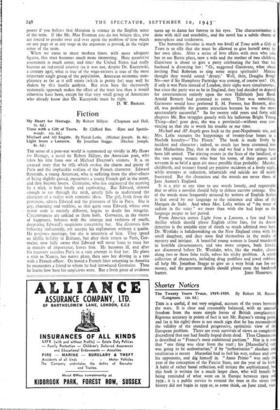Fiction
Time with a Gift of Tears. By Clifford Bax. (Eyre and Spottis- woode. los. 6d.)
Michael and All Angels. By Norah Lofts. (Michael Joseph. 8s. 6c1.)
Light from a Lantern. By Jonathan Stagge. (Micbae. Joseph. 8s. 6d.) THE sense of a post-war world is summoned up vividly in My Heart for Hostage, a novel by Robert Hillyer, the American poet, who takes his title front one of Michael Drayton's sonnets. It is an unusual story that he ttlls which evokes the charm and gaiety of Paris and the implacable realism of the French character. Edward Reynolds, a young American, who is suffering from the after-effects of being slightly gassed, encounters a young French girl in the street, and they become lovers. Germaine, who has engineered the meeting by a trick, is both lovely and captivating. But Edward, shrewd enough to see through the trick, utterly fails to understand the character of a realist with romantic ideas. The girl, fresh from the provinces, adores Edward and the pleasures of life in Paris. She is gay, charming and reckless, so that quite soon Edward, whose own moral code is entirely different, begins to doubt her integrity. Circumstances are unkind to them both. Germaine, in the excess of happiness, behaves with the courage and rashness of youth, deepening Edward's suspicions concerning her. She discovers him behaving indiscreetly, yet accepts his explanation without a qualm. He proposes marriage, but she is uncertain of him. They spend an idyllic holiday in Brittany, but after their return to Paris, Ger- maine, now fully aware that Edward will never learn to trust her in matters of importance, leaves him. He becomes ill, and after his recovery searches Paris in a vain attempt to find her. He plans a visit to Nantes, her native place, then sees her driving in a taxi with a French officer. On board a French liner returning to America he encounters a friend to whom he had introduced Germaine. Then he learns how base his suspicions were. But a fresh piece of evidence turns up to damn her forever in his eyes. The characterisation is done with skill and sensibility, and the novel has a subtle charm of atmosphere and tenderness.
The horrorine (heroine is much too kind) of Time with a Gift of Tears is so silly that she must be allowed to give herself away by her own ideas. After a series of love affairs with men who take her to see Barrie plays, now a wife and the mother of two children, Guinivere is about to give a party celebrating the fact that her husband is divorcing her: " Or, suggested Guinivere, what about inviting Paul Robeson to sing some negro spirituals? Maxine thought they would sound ' dreary.' Well, then, Douglas Byng? No—not if Sir Humphrey Partridge was coming, of course not! Oh, if only it was Paris instead of London, their sighs were simultaneous ; but since the party was to be in England, they had decided to depend for entertainment entirely upon the new Hallelujah Jazz Band. Arnold Bennett had promised to come. That was something. Guinivere would have preferred E. M. Forster, but Bennett, after all, was probably the greater attraction because he was the more spectacularly successful." So for twenty odd years and forty odd chapters Mr. Bax struggles gamely with his ludicrous Bright Young Thing—alas! poor dear, she was a provincial—without ever con- vincing us that she is worth his trouble or our time.
Michael and All Angels goes back to the post-Napoleonic era, and Mrs. Lofts recounts the happenings of twenty-four hours in a Norfolk hostelry= The Fleece.' The book is made lively by incident and character ; indeed, so much has been crammed into that Michaelmas Day, that in the end we find a few strings have been left untied. The stirring events in the lives of the landlord, of the two young women who bear his name, of their guests and servants in so brief a span are more possible than probable. Murder, childbirth, and treasure found are positive incidents of a lively night, while attempts at seduction, infanticide and suicide are all neatly frustrated. But the characters and the morals are never those of Jane Austen's England.
It is a pity at any time to use words loosely, ,and regrettable that so often a novelist should help to debase cut rent coinage. One of the words most frequently misused by writers of English fiction is-that owed by our language to the existence and ideas of the Marquis de Sade. And when Mrs. Lofts writes of " the trace of sadism in the voice " we more than wish she had kept to the language proper .to her period.
From. America comes Light from a Lantern, a fast and lively thriller which should please English crime fans, for its doctor detective is the amiable -type of sleuth so much admired over here. Dr. Westlake is holidaymaking on the New England coast with his small daughter, and they soon find themselves in the midst of mystery and intrigue. A beautiful young woman is found murdered in horrible circumstances, and two more corpses, both female, are discovered before Dr. Westlake, who, like the reader, chases along two or three false trails, solves his sticky problem. A whole collection of characters, including drug peddlars and jewel robbers, all help Mr. Jonathan Stagge to give us a very brisk run for our money, and the gruesome details should please even the hardened


























 Previous page
Previous page